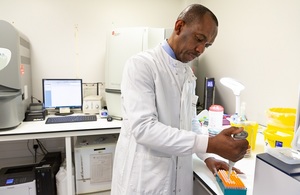Most vulnerable set to benefit from further £1 million investment to safeguard modern medicine
The Global Antimicrobial Resistance Innovation Fund is investing further funding to support the development of innovative treatments for antibiotic-resistant infections.

People most vulnerable to life-threatening bacterial infections, including newborns, elderly and those in hospital are set to benefit from an extra £1 million boost to support the development of innovative treatments for antibiotic-resistant infections.
The Global Antimicrobial Resistance Innovation Fund (GAMRIF), part of the Department of Health and Social Care, is investing further funding to help the Global Antibiotic Research and Development Partnership (GARDP) efforts to tackle antimicrobial resistance (AMR), one of the greatest threats to global health.
The new investment represents a contribution to all GARDP programmes, including to the development of SECURE, a new antibiotics initiative co-developed by GARDP and the World Health Organization (WHO) in collaboration with other international bodies.
SECURE’s mission is to expand access to essential antibiotics to prepare countries for the silent pandemic of drug-resistant bacterial infections. These essential medicines will include new antibiotics to combat drug-resistant infections, but also existing antibiotics that are not widely available or suffer from frequent supply chain interruptions and shortages.
The unchecked growth of drug-resistant infections has long-term implications. Resistant infections kill an estimated 700,000 people a year, a number projected to increase exponentially as drug resistance grows and imperils our ability to treat even common infections. The consequences of not addressing this now could result in a future where we are unable to treat common infections such as pneumonia, urinary tract infections and infections in newborns.
Lord Bethell, Minister for Innovation, said:
Antimicrobial resistance is one of the biggest threats to global health, making common infections more difficult to treat and risking lives. This is a key focus of our G7 presidency and I am looking forward to further discussions on this with the world’s major democracies at the health ministers’ meetings in June.
Our additional funding will continue to support the fantastic work of GARDP in the development of vital treatments to treat drug-resistant infections. This will help safeguard the future of modern medicine.
Seamus O’Brien, GARDP Director of Research and Development, said:
We are extremely pleased by the UK’s increased contribution at a time when COVID-19 has demonstrated the critical importance of preventing and preparing for pandemics, including the pandemic of drug-resistant infections.
By investing an additional £1 million, the UK is again demonstrating leadership in efforts to accelerate the development and delivery of life-changing and life-saving treatments for every person who needs them.
With the UK’s 2021 G7 presidency prioritising global health threats, this funding recognises that effective antibiotics underpin modern healthcare, and reinforces the partnership between the UK and GARDP to ensure that such antibiotics are available now and for future generations.
The funding comes on top of £13 million previously committed by the UK government to GARDP. Funding both GARDP’s pipeline and the development of SECURE reflects the shared belief of GARDP and GAMRIF that developing new treatments and ensuring responsible access for all in need are inseparable.